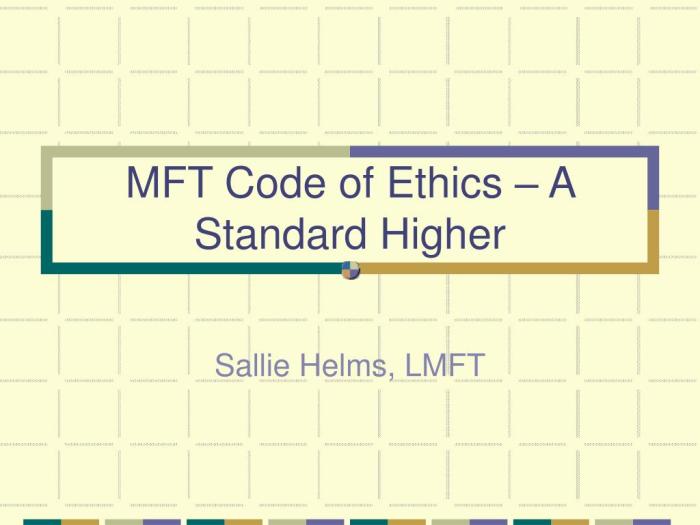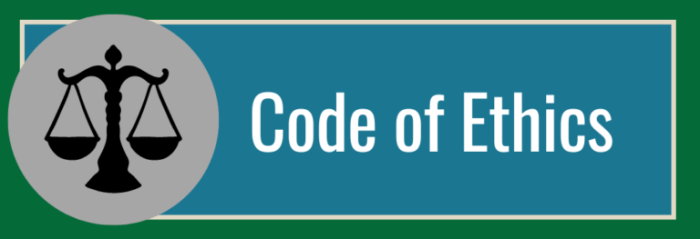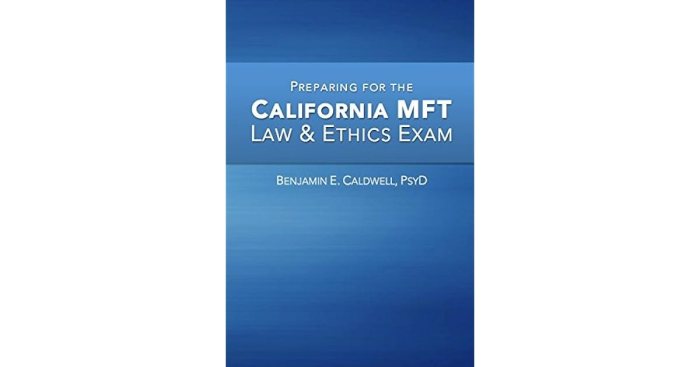Mft code of ethics california – The MFT Code of Ethics in California provides a comprehensive framework for ethical practice for marriage and family therapists (MFTs) in the state. This code ensures that MFTs maintain high standards of professional conduct and protect the well-being of their clients.
In this article, we will explore the core ethical principles, specific guidelines, and enforcement mechanisms that govern the ethical practice of MFTs in California.
The California MFT Code of Ethics is based on the ethical principles of autonomy, respect for persons, beneficence, nonmaleficence, justice, fidelity, and responsibility. These principles guide MFTs in their interactions with clients, colleagues, and the public.
Introduction to MFT Code of Ethics in California

The Marriage and Family Therapist (MFT) Code of Ethics in California is a set of ethical guidelines that govern the professional conduct of MFTs practicing in the state. It Artikels the ethical principles and standards that MFTs must adhere to in their work with clients, colleagues, and the public.
The purpose of the code is to protect the public by ensuring that MFTs provide competent and ethical services. It also helps to maintain the integrity of the profession and to promote public trust in MFTs.
Importance of the Code of Ethics
The Code of Ethics is essential for MFTs practicing in California because it provides a clear framework for ethical decision-making. It helps MFTs to identify and avoid potential ethical pitfalls, and it provides guidance on how to handle ethical dilemmas that may arise in their work.
Adhering to the Code of Ethics also helps MFTs to build trust with their clients and colleagues. By demonstrating their commitment to ethical practice, MFTs can create a safe and supportive environment for their clients and foster a sense of trust and respect among their colleagues.
Ethical Principles for MFTs in California

The California Association of Marriage and Family Therapists (CAMFT) has established a comprehensive set of ethical principles that guide the professional conduct of Marriage and Family Therapists (MFTs) in the state. These principles are based on the fundamental values of respect for autonomy, beneficence, justice, and fidelity.
MFTs in California are expected to adhere to these ethical principles in all their professional interactions, including those with clients, colleagues, and the public. By doing so, they demonstrate their commitment to providing ethical and competent services to the individuals and families they serve.
Autonomy and Respect for Persons
MFTs in California are committed to respecting the autonomy and dignity of their clients. This means that they:
- Recognize and respect the client’s right to make decisions about their own life and treatment.
- Provide information about the risks and benefits of treatment in a clear and understandable way.
- Obtain informed consent from clients before providing services.
Specific Ethical Guidelines for MFTs in California

MFTs in California are bound by a comprehensive set of ethical guidelines established by the California Association of Marriage and Family Therapists (CAMFT) and the California Board of Behavioral Sciences (BBS). These guidelines aim to protect clients’ rights and ensure the ethical practice of marriage and family therapy.
The following are some specific ethical guidelines that apply to MFTs in California:
Confidentiality
MFTs in California are required to maintain the confidentiality of all client information, including communications, records, and notes. This includes both verbal and written communications, as well as any other information that could identify a client.
There are a few exceptions to the confidentiality rule, such as when a client poses a danger to themselves or others, or when the MFT is required by law to disclose information.
Dual Relationships
MFTs in California are prohibited from engaging in dual relationships with clients. This means that they cannot have any other relationship with a client outside of the therapeutic relationship, such as a romantic, sexual, or financial relationship.
Dual relationships can create conflicts of interest and can compromise the therapeutic relationship. They can also lead to exploitation and abuse of clients.
Informed Consent
MFTs in California are required to obtain informed consent from clients before providing any services. This means that clients must be fully informed about the nature of the services, the risks and benefits of therapy, and their rights and responsibilities.
Informed consent helps to ensure that clients are making informed decisions about their treatment and that they are not being coerced into therapy.
Record Keeping
MFTs in California are required to keep accurate and complete records of all client interactions. These records must include information such as the client’s name, contact information, dates of service, and a summary of the services provided.
Record keeping helps to ensure the quality of care provided and can be used to track client progress over time.
Ethical Decision-Making for MFTs in California

Ethical decision-making is a complex process that requires MFTs to consider a variety of factors, including the ethical principles of the profession, the specific circumstances of the case, and the potential benefits and harms of different courses of action. The following framework can help MFTs make ethical decisions:
1. Identify the ethical issues. The first step in ethical decision-making is to identify the ethical issues that are involved in the case. This can be done by considering the facts of the case, the relevant ethical principles, and the potential benefits and harms of different courses of action.
2. Consider the relevant ethical principles. Once the ethical issues have been identified, the next step is to consider the relevant ethical principles. The MFT Code of Ethics provides a number of ethical principles that can guide MFTs in their decision-making.
These principles include:
- Respect for the dignity and worth of the person
- Primacy of beneficence
- Nonmaleficence
- Autonomy
- Justice
- Fidelity
3. Weigh the potential benefits and harms. Once the relevant ethical principles have been considered, the next step is to weigh the potential benefits and harms of different courses of action. This can be done by considering the following factors:
- The likelihood that the action will achieve its intended goal
- The potential benefits of the action
- The potential harms of the action
- The distribution of the benefits and harms
4. Consult with colleagues or supervisors. In some cases, it may be helpful to consult with colleagues or supervisors to get their input on the ethical issues involved in a case. This can help MFTs to make more informed decisions and to avoid making ethical mistakes.
Enforcement of the MFT Code of Ethics in California
The enforcement of the MFT Code of Ethics in California is overseen by the Board of Behavioral Sciences (BBS). The BBS is responsible for investigating and adjudicating ethical complaints against MFTs.
The MFT Code of Ethics in California is a set of guidelines that all marriage and family therapists must follow in their practice. These guidelines cover a wide range of topics, including confidentiality, informed consent, and ethical decision-making. While the MFT Code of Ethics is specific to California, it is based on the national ethical guidelines for marriage and family therapists.
For example, both the California and national codes of ethics prohibit therapists from engaging in sexual relationships with their clients. The California code of ethics also includes specific guidelines on topics such as advertising and social media use. To learn more about the MFT Code of Ethics in California, you can visit the website of the California Association of Marriage and Family Therapists ( what is cataracts in egypt ). The CAMFT website provides a variety of resources on the code of ethics, including a downloadable PDF of the full document.
Process for Enforcing the MFT Code of Ethics
The process for enforcing the MFT Code of Ethics in California typically involves the following steps:
- A complaint is filed with the BBS.
- The BBS investigates the complaint to determine if there is probable cause to believe that an ethical violation has occurred.
- If probable cause is found, the BBS may file a formal accusation against the MFT.
- The MFT has the opportunity to respond to the accusation and request a hearing.
- If a hearing is held, an administrative law judge will hear the evidence and make a recommendation to the BBS.
- The BBS will then make a final decision on the case.
Role of the Board of Behavioral Sciences
The BBS plays a vital role in enforcing the MFT Code of Ethics in California. The BBS has the authority to investigate ethical complaints, file formal accusations, and discipline MFTs who have violated the code of ethics. The BBS also provides guidance to MFTs on ethical issues and helps to educate the public about the importance of ethical behavior in the mental health profession.
Resources for MFTs on Ethical Practice in California
Navigating ethical dilemmas in the field of marriage and family therapy (MFT) requires guidance and support. MFTs in California have access to a range of resources that provide invaluable assistance in adhering to ethical principles and best practices.
The California Association of Marriage and Family Therapists (CAMFT), Mft code of ethics california
CAMFT is a professional organization dedicated to supporting MFTs in California. It offers a comprehensive range of resources, including:
- Ethical guidelines and resources
- Continuing education opportunities
- Legal and practice consultation
- Advocacy and representation
The American Association for Marriage and Family Therapy (AAMFT)
AAMFT is the national organization for MFTs. It provides a wealth of resources, including:
- Code of ethics and ethical guidelines
- Online ethics training
- Webinars and conferences on ethical issues
- Legal and practice consultation
The California Board of Behavioral Sciences (BBS)
The BBS is the state agency responsible for licensing and regulating MFTs in California. It provides:
- The MFT Code of Ethics
- Enforcement of the Code of Ethics
- Guidance on ethical practice
- Investigations of ethical complaints
FAQ Compilation: Mft Code Of Ethics California
What is the purpose of the MFT Code of Ethics in California?
The MFT Code of Ethics in California provides a framework for ethical practice for marriage and family therapists in the state. It ensures that MFTs maintain high standards of professional conduct and protect the well-being of their clients.
What are the core ethical principles that guide MFTs in California?
The core ethical principles that guide MFTs in California include autonomy, respect for persons, beneficence, nonmaleficence, justice, fidelity, and responsibility.
What are some specific ethical guidelines that apply to MFTs in California?
Some specific ethical guidelines that apply to MFTs in California include confidentiality, dual relationships, informed consent, and record keeping.
How is the MFT Code of Ethics in California enforced?
The MFT Code of Ethics in California is enforced by the Board of Behavioral Sciences, which investigates and adjudicates ethical complaints.